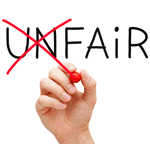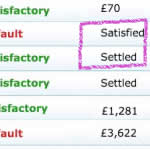Support for Mortgage Interest (SMI) helps some people with the cost of their mortgage if they aren't working. Since 2018 this help has been paid as a loan secured on your house, not a benefit, see the gov.uk page on SMI. But this loan is cheap, you don't have to make any repayments to it until the house is sold and it does not show on your credit record, so this is not as bad as it … [Read more...]
Other Money
I write about a lot of Personal Finance that isn't directly about problem debts. Those articles are gathered here.
Spending - reducing or controlling it is usually essential if you want to reduce your debts. So Budgeting is another big topic.
Your grandparents used a pen and paper, but now we have Apps to make all this easier.
Mortgages - sometimes thought of as the only good sort of debt!
Credit ratings - important if you have too much debt or very little!
Can I get a mortgage with recent defaults?
A reader, Mr D, asked: My partner and I have a combined income of £56,000, We have a deposit of £28,000 (inheritance) and are looking to become first time buyers at a price of £230,000. We have defaulted debts that are being paid off, and previous history of payday loans from over 2 years ago from a time when our financial situation was much more difficult. The defaults are about 18 months … [Read more...]
How much will my credit score change if … ?
How much will my credit rating go up or down? That is a very common question. But it's often tricky to answer! This article has some guideline numbers from Experian that may help. These are only indications - your credit score may not go up or down by this much. They assume nothing else has changed on your record. They also apply to single issues. If you have two defaults already, getting … [Read more...]
How Pardners work – friends save & borrow in an informal club
Rotating Savings and Credit Associations (ROSCAs) are arrangements that allow friends to save together and withdraw lump sums from the scheme. ROSCAs are unregulated, relying on trust. The Money Advice Service says "those who use [ROSCAs] say they encourage savings and allow people without bank accounts access to credit." They have different names around the world, including tanda in South … [Read more...]
How to add a Notice of Correction to a credit record – and is it worth it?
Finding something negative on your credit record is bad enough - but it feels a lot worse if you think it is wrong or unreasonable. You have the legal right under the Consumer Credit Act to add a "Notice of Correction" to your credit report if you feel something is misleading or you want to provide an explanation. What is a Notice of Correction? A Notice of Correction is something you … [Read more...]
What is the difference between “settled” and “satisfied” on a credit report?
A reader asked: My Credit Karma report shows some settled debts but one is shown as satisfied. I am sure I paid them all off in full. Does it make a difference and should I ask for this to be changed? … [Read more...]





